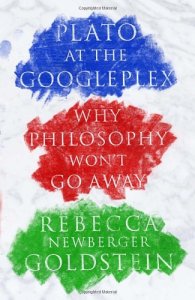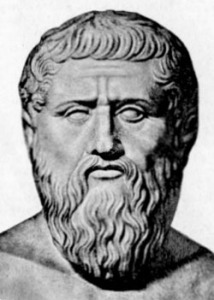
Note: This post is an updated and mostly abbreviated version of one I did at my own blog originally titled “Intelligent Design Even an Atheist Can Love: a Not-So-New “Logos” Reasserted”. I also did a follow-up to that post titled “The Gods of our Brahmins: Thomas Nagel’s and Rebecca Goldstein’s Intelligent Designers”.
In sum: Years ago, Phillip Johnson’s Darwin on Trial started what came to be known as the “intelligent design movement”, which made the case for the bankruptcy of philosophical naturalism. Many scientists and atheists howled, but twenty years later, I suggest he’s basically been vindicated: philosopher Rebecca Goldstein comes in to do a salvage job, with Plato’s help, because she basically realizes persons like Johnson were right.
I recently read Plato at the Googleplex: Why Philosophy Won’t Go Away, the latest offering from Rebecca Newberger Goldstein. Goldstein is the wife of the renowned Harvard scientist Stephen Pinker – intellectually, there is arguably no more influential and formidable pair. Both Pinker and Goldstein are known for their irenicism, and Goldstein, for her part, has even been called the “atheist with soul”.
Though heady, Plato at the Googleplex is well-written and has received numerous accolades, including high praise from the prominent agnostic philosopher A.C. Grayling. It seeks to bring the questions of Plato into the modern world and does so in a big way, featuring dialogues with a scientifically-updated Plato and 21st century interlocutors in very interesting contexts (the Googleplex, talk shows, advice columns, and brain-scanning laboratories). These chapters are interspersed between other chapters which better explain Plato’s ideas and the origin and historical context of those ideas.

I would recommend this book for any Christian who wants to know where the secular world is going as regards sophisticated belief systems. Some of our elites, in seeking to address the problems of our age, have advocated a return to more polytheistic ideas (see the review I did of All Things Shining by Hubert Dreyfus and Sean Dorrance Kelly here). I am guessing many with more poetic tastes will veer in this direction. Others, like Goldstein, are looking to promote ideas that have a lot in common with Benedictus Spinoza, who, I would say, basically put the elite philosophies of the Eastern world into a more Western frame (that is, a frame influenced heavily by Greek and Judeo-Christian ideas, though Goldstein, to say the least, downplays the latter).
I see the greatest challenge to Christian thought not in the likes of an atheism that a Hitchens, Harris, Dawkins or a Dennett might espouse. Rather, I think it is persons like Goldstein who presents us with the most formidable challenge. If I recall, Richard Dawkins himself has admitted that he does not see anything objectionable to this kind of Spinozan theologizing/philosophizing. This kind of system poses an appealing alternative to a pure philosophical naturalism, which has attempted to strip reality of all that is spiritual, or at least seems to point us in that direction.
For me, one of the most important statements in the whole book occurs on p. 309, where Goldstein discusses what it means to escape Plato’s cave:
“One must integrate the beautiful proportionality of the character of the physical universe into one’s own moral character, and then, and only then, will one see oneself in relation to all else – and all others – in the right perspective, the distortions of the cave corrected. This is not a dispassionate process. Plato always stressed how much love is involved in the process…”
Sounds a bit like a form of natural law that exists intrinsically outside of ourselves, right? But she says next:
“…But it’s love of an impersonal kind, not love for persons, that reforms one’s moral being. Plato would have approved this paragraph from Spinoza’s Ethics: “Therefore, without intelligence, there is not rational life: and things are only good, in so far as they aid man in his enjoyment of the intellectual life, which is defined by intelligence. Contrariwise, whatsoever things hinder man’s perfecting of his reason, and capability to enjoy the rational life, are alone called evil” (Appendix, Part IV, v).
Quite the logos Goldstein has there.*
And let me shares an extended quotation from the book that exhibits Goldstein’s argumentation, where she speaks of an impersonal best reason, or logos, “out there”, which conforms with the reason we have inside ourselves as subjects. From pp. 52-53:
“…what does Plato mean by goodness, and how does he entwine it with truth and beauty?
Plato’s truth-entwined goodness can best be gotten to by way of “the best reason” that he sees lurking inside truth. The truth is as it is because “the best reason” is determining it to be so. His language is, at first blush, suspiciously teleological, even suggestive of intentionality. Did someone – Some One – implement this best reason, designing the world accordingly? Or is it rather that the best reason works all on its own, a self-starter, with nothing external to it required to put it into action? It was the latter possibility that Plato had in mind. If there is “mind” determining the truth, an idea put forth in the Phaedo and explored in greater depth in the Timaeus, the existence of this mind amounts to nothing over and above the assertion that the truth is determined by “the best reason.” In other words, the best and final scientific theory would work all on its own to create the world in accordance with itself. In the Timaeus he presents a creation myth, in which a demiurge, or divine Craftsman, is implementing “the best reason,” but his using a myth to dramatize the point is in itself an indication that it’s a more abstract metaphysical principle he has in mind: the best reason, is, in itself, a self-starter, and explanation that explains itself a causa sui, as Spinzoza – who picked up this Platonic intuition and ran all the way with it – was to put it.
The determining role of “the best reason” in making the world what it is is what the goodness in Truth-Beauty-Goodness consists in. Goodness is interwoven with truth because the best explanation for the truth is that truth is determined by the best reason, and the best reason works all on its own – which is as good as it gets. The truth, being determined by the best reason, is ultimately capable of explaining itself. This makes reality as intelligible as it could possibly be. It’s its very intelligibility that provides the reasons for its existence. For intelligibility-craving minds, what could possibly be more sublime?
And once again, as it was with beauty so it is with goodness: it is mathematics that largely foots the bill. The best reason is the reason that is thoroughly intelligible, that presents its own justification transparently to the mind, which is what mathematics does (Republic 511d, Timaeus passim). In the creation myth of the Timaeus, the divine Craftsman imposes as much mathematics on the material world as it can possibly hold, because mathematics is the most perfect expression of the good intentions – the best reasons – by which the mythical Craftsman works (29d-e). The mythical Craftsman doesn’t make the forms he imposes on the world the best by virtue of choosing them; rather he chooses them because they are, independent of him, the best of forms, and their being the best of forms in itself explains why this must be realized.
The talk of “the best reason,” which sounds deceptively teleological, is not teleological at all. The causality is fueled by the mathematics. The causality is at one with the intelligibility. In fact, it was the return to this version of Platonism that managed to get the teleology out of physics, by displacing Aristotle’s final causes with Plato’s mathematical conception of causality. Spinoza, who, like other seminal thinkers of the seventeenth century, was rebelling against the Aristotelian-scholastic teleology that held sway, put the point this way: “Such a doctrine (teleology) might well have sufficed to conceal the truth from the human face for all eternity, if mathematics had not furnished another standard of truth…. Without regard to…. final causes.” (Ethics I, Appendix. Trans. R.H.M. Elwes, 1883. Revised ed. [London: George Bell and Sons, 1901])
!["The structure of the world is shot through with a sublimity so sublime that it had to exist. Reality exists because it, too, [like the Greeks in Athens,] is striving to achieve an existence worth the existing. The cosmos itself is a high achiever, and existence is the prize." (p. 385)](https://wp-media.patheos.com/blogs/sites/523/2015/04/rebecca_goldstein.jpg)
Goldstein states forthrightly, echoing Plato, that the “good is what bestows existence”. She does not shy away making universally-binding value judgements either: “The word “best” is overtly evaluative. There is no escaping evaluation, no more in deciding what is rational to believe than in deciding what is ethical to do.” (p. 385)
She looks to Plato as her main guide, though accepting his “theory of forms” only in a severely abbreviated way:
Plato’s own explanation of universals in terms of the abstract forms has been dropped in favor of other explanations. His so-called Theory of Forms created more mysteries than it solved. There’s evidence that he himself drew the same conclusion as a result of the battery of criticisms he lodged at the theory in the Parmenides. In the Timaeus and the Laws, the most intelligible – and therefore beautiful – of the forms are conceived in terms of mathematical structures, other forms dropping away….” (p. 386)
Again, her Plato is used in contrast to Aristotle, with his explicit teleological views:
“….it is Plato, particularly the Plato of the Timaeus, who is made to carry the spirit of rebellion that rose up in the sixteenth and seventeenth century against the dogmatized Aristotelian teleology. Finding their way back to Plato, the new physicists seize on mathematics as the very soul of explanation – and the more beautiful the mathematics the more explanatory value it is judged to have.” (p. 388)
Even if Plato would have perhaps been cautious in going in such a non-teleological direction (“don’t go there”, we say today), the important point, it seems to me, is that his ideas and system allow for it in the first place. In other words, the loose system we seem to be able to determine that he upheld – bolstered by some flimsy myths not seriously rooted in history (see, in contrast, the book of Acts, particularly chapter 17, particularly the end of that chapter) – can be readily hijacked and colonized by those eager to see not only theological assertions but specific teleological assertions as well (where particular things are created for a particular purposes) bite the dust.

But wait a minute! On second thought, how is Goldstein’s position really that different then what Thomas Nagel wrote about a couple years ago – in the book Mind and Cosmos** – only to be savagely attacked? While Goldstein even has some serious words of critique for the philosophically naturalistic physicist Laurence Krauss, she, unlike Nagel, somehow manages to avoid the wrath of the freethinking community. Why?
It is a bit puzzling. While in his book Mind and Cosmos, Nagel speaks of the possibility of a kind of “teleology”, saying that we could discover principles which may be goal-oriented or teleological (instead of materialist or mechanistic), he, like Goldstein, does not thereby have in mind the idea of an external Person with intention (“even if teleology is separated from intention, and the result is not the goal of an agent who aims at it”). He is rather proposing something we might call an “immanent teleology” (“order that governs the natural world from within”), where human beings, for example, arise because of a “a bias towards the marvelous” (92, Mind and Cosmos, quoted here). Other than de-emphasizing the importance of human beings, is this not basically what Goldstein is doing? Even if she is loath to use the word teleology, because of its current associations with Aristotle (and with him Aquinas) and the Intelligent Design movement (see more on Nagel’s book here and here)?
I think it is (and I will defend this assertion in a later post). Further, I would suggest that she is at some level doing this intentionally, because she understands the absolute intellectual bankruptcy of clinging to philosophical materialism (the assertion at the beginning of the post).

Before moving on there is another important point to emphasize here. The popular conservative writer Rod Dreher recently tweeted: “the philosopher Josef Pieper, in his great little book Only the Lover Sings: Art and Contemplation] confronts [the] core civilizational question today: Is truth, is reality, something we invent, or discover? Much rides on the answer.”
But as Goldstein shows us, even if someone says that the truth is something that we discover “out there” (“Plato… is firmly on the side of the Reasonables. Everything we need to know – intellectually and morally – is out there”*** – p. 384), that certainly does not mean that they will necessarily embrace traditional Judeo-Christian understandings of natural law.
On the contrary, her viewpoint allows for a person to embrace the idea that there is some kind of unchanging, eternal, and external reality while also allowing for all manner of change and flux in the material cosmos we inhabit. Some instability – progress! – in our understandings of the natures of things and morality can be permitted****, so long as wisdom and balance can be found by recognizing the harmony present in the stable and permanent forms – basically meaning the beautiful and impersonal mathematics underlying all things.
What to say to all of this? How about this?:
“How is it responsible to think about impersonal intelligence, mind, or consciousness (these are completely oxymoronic concepts) – especially when thinking of the cosmos’ origins?” Simply put, if reality is fundamentally impersonal, than we are impersonal. And if the cosmos itself can’t be said to be caused, than it makes little sense to think personal responsibility and consequences for actions are anything other than a purely pragmatic matter.
It seems to me that all of this is pointing in a certain direction which is this: when it comes to Reason’s march in the battle of ideas, those ideas that are true will work and those that work will be true. While it may take time to play out in history, the Reasonable persons know that the best will rise to the top – leaving those who refuse to be enlightened and progress in the dustbin of history. For those who have inherited Christianity’s moral capital, they now think they can be most “Christian” by leaving Christianity behind.
Citing modern Calvinist philosophers like Alvin Plantiga to illustrate her point, Goldstein would make a sharp distinction between the religious impulse (belonging to the intuitive realm) and the realm of the rational, which deals with things “out there” that we can discuss and hold one another accountable over*****. This might be a sensible critique for other faiths, not grounded in history, but not Christianity. I would suggest that she has either paid insufficient attention to, or has conveniently ignored passages like Acts 17:31 (and the whole book of Acts for that matter, steeped in history******), with what we might call its “evidentially-based considerations”.
For in the beginning was the Logos, and the Logos was with God and was God…. I encourage you to check out the real Logos… One that doesn’t cut the person and “contingent” history (and along with this divine revelation and miracles) out of the picture. Come and see, perhaps with the Apostle John as your first guide….
FIN
Notes:
*She goes on to write: “Morality necessarily crosses, for these philosophers, thorough the headiest of intellectual terrain, and that is a path that – I don’t think they’re particularly happy about this – few can follow.” I immediately though about Charles Murray’s book “Coming Apart” and the new book by Robert Putnam: “Our kids: the American Dream in Crises”. I note that the kind of statement made by Goldstein could be taken to rationalize away the culpability of the elites for not upholding moral norms as something that all should strive to attain.
**Nagel, in an article in the N.Y. Times, summing up the main point of his book:
“I believe [the Materialist Neo-Darwinian Conception of Nature] is ruled out by the conditions that have defined the physical sciences from the beginning. The physical sciences can describe organisms like ourselves as parts of the objective spatio-temporal order – our structure and behavior in space and time – but they cannot describe the subjective experiences of such organisms or how the world appears to their different particular points of view. There can be a purely physical description of the neurophysiological processes that give rise to an experience, and also of the physical behavior that is typically associated with it, but such a description, however complete, will leave out the subjective essence of the experience – how it is from the point of view of its subject — without which it would not be a conscious experience at all…biological evolution must be more than just a physical process, and the theory of evolution, if it is to explain the existence of conscious life, must become more than just a physical theory….a scientific understanding of nature need not be limited to a physical theory of the objective spatio-temporal order. It makes sense to seek an expanded form of understanding that includes the mental but that is still scientific — i.e. still a theory of the immanent order of nature.” (non-italicized words highlighted by me).
I translate this to meant that no theism, transcendence, interventionism, or divine revelation is necessary to how we view the world (even if Nagel, as well as others, certainly would insist that it could be added). Here, it seems to me that Reason, though perhaps not conceptions that have been fully imagined yet, trumps the real Logos and His work in history. Plato (perhaps), Spinoza, Hume (likely), Kant, and Goldstein, it seems, would all be quite happy to have a system of Reason that purports to explain all without the biblical Creator.
Nagel ends his article:
“Mind, I suspect, is not an inexplicable accident or a divine and anomalous gift but a basic aspect of nature that we will not understand until we transcend the built-in limits of contemporary scientific orthodoxy. I would add that even some theists might find this acceptable; since they could maintain that God is ultimately responsible for such an expanded natural order, as they believe he is for the laws of physics.”
It seems clear to me that this would be a fatal compromise. Does either deism or such pantheism have room for the furious God of the Bible who is called Jesus, the Christ? Looking at this realistically (not so much cynically) it simply seems to me that Nagel was simply taking the lead among the most intelligent agnostics and atheists who are in the business of creating systems that by definition exclude the possibility of transcendence and divine revelation.
***She goes on to say:
“….and the way we come to see what is out there is no more private and unshareable than the reality itself is. One proceeds by way of reason, by offering the best explanations for the questions that each level [attained after leaving the cave] presents. An anonymous, allegorical knower stands in for any of us, so allow me to change the gender of the pronoun. The knower doesn’t come with any special cognitive equipment of a kind to make her privy to special messages from outside the cave. It’s on the power of her own reason that she achieves the vision of the sun. Not only is this a path that is, in principle, open to anyone, but it is a path that requires collaborators, since judging what is the best explanation is an activity best done with others, as the man who founded the Academy, gathering the best thinkers of the day there to join him, must have believed. The prisoner was herself first freed and dragged forward on the first leg of her trip by someone else, and once she sees the sun she remembers the prisoners still fettered in the cave and pities them, returning to help them make the ascent that she has achieved. (It doesn’t necessarily end well. Prisoners of ideology don’t necessarily welcome liberation.)
****Interesting from the WSJ review of Goldstein’s book (about a year ago):
****** One need not believe the book of Acts is infallible to have confidence that the Apostle Paul said this or that what he said might be worth listening to or asking serious questions about [note also Luke’s reputation for being a good historian here as well – i.e. being verifiable in many respects. Also, it is true that while this is certainly an invitation into what all would call “evidentially-based considerations”, this statement is nevertheless more of an assertion about how God has made Himself known in history – and what He calls proof and defines as proof.
















